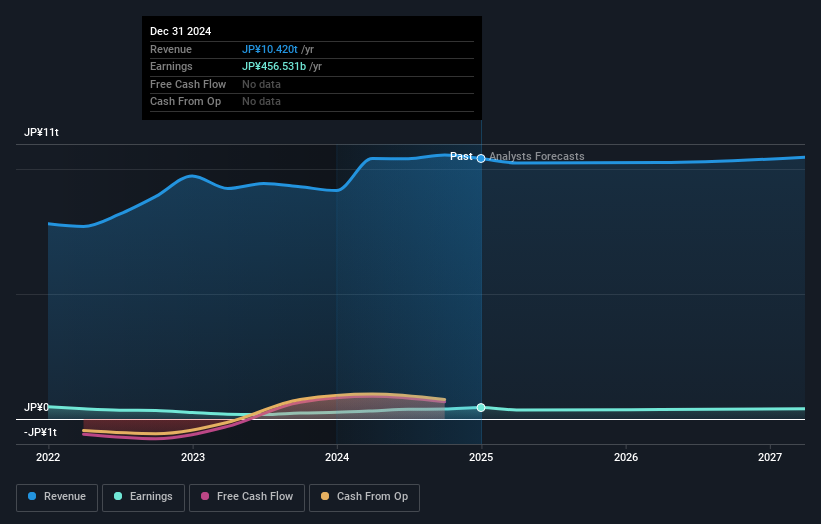Dai-ichi Life Holdings, Inc.'s (TSE:8750) high institutional ownership speaks for itself as stock continues to impress, up 3.1% over last week

Key Insights
- Significantly high institutional ownership implies Dai-ichi Life Holdings' stock price is sensitive to their trading actions
- 50% of the business is held by the top 22 shareholders
- Ownership research along with analyst forecasts data help provide a good understanding of opportunities in a stock
If you want to know who really controls Dai-ichi Life Holdings, Inc. (TSE:8750), then you'll have to look at the makeup of its share registry. With 46% stake, institutions possess the maximum shares in the company. In other words, the group stands to gain the most (or lose the most) from their investment into the company.
And last week, institutional investors ended up benefitting the most after the company hit JP¥4.0t in market cap. The one-year return on investment is currently 35% and last week's gain would have been more than welcomed.
Let's take a closer look to see what the different types of shareholders can tell us about Dai-ichi Life Holdings.
See our latest analysis for Dai-ichi Life Holdings

What Does The Institutional Ownership Tell Us About Dai-ichi Life Holdings?
Institutions typically measure themselves against a benchmark when reporting to their own investors, so they often become more enthusiastic about a stock once it's included in a major index. We would expect most companies to have some institutions on the register, especially if they are growing.
As you can see, institutional investors have a fair amount of stake in Dai-ichi Life Holdings. This suggests some credibility amongst professional investors. But we can't rely on that fact alone since institutions make bad investments sometimes, just like everyone does. If multiple institutions change their view on a stock at the same time, you could see the share price drop fast. It's therefore worth looking at Dai-ichi Life Holdings' earnings history below. Of course, the future is what really matters.

Our data indicates that hedge funds own 11% of Dai-ichi Life Holdings. That's interesting, because hedge funds can be quite active and activist. Many look for medium term catalysts that will drive the share price higher. Effissimo Capital Management Pte Ltd. is currently the company's largest shareholder with 11% of shares outstanding. In comparison, the second and third largest shareholders hold about 6.8% and 4.0% of the stock.
Looking at the shareholder registry, we can see that 50% of the ownership is controlled by the top 22 shareholders, meaning that no single shareholder has a majority interest in the ownership.
While it makes sense to study institutional ownership data for a company, it also makes sense to study analyst sentiments to know which way the wind is blowing. Quite a few analysts cover the stock, so you could look into forecast growth quite easily.
Insider Ownership Of Dai-ichi Life Holdings
The definition of an insider can differ slightly between different countries, but members of the board of directors always count. Management ultimately answers to the board. However, it is not uncommon for managers to be executive board members, especially if they are a founder or the CEO.
Insider ownership is positive when it signals leadership are thinking like the true owners of the company. However, high insider ownership can also give immense power to a small group within the company. This can be negative in some circumstances.
Our data suggests that insiders own under 1% of Dai-ichi Life Holdings, Inc. in their own names. As it is a large company, we'd only expect insiders to own a small percentage of it. But it's worth noting that they own JP¥1.8b worth of shares. It is good to see board members owning shares, but it might be worth checking if those insiders have been buying.
General Public Ownership
With a 43% ownership, the general public, mostly comprising of individual investors, have some degree of sway over Dai-ichi Life Holdings. This size of ownership, while considerable, may not be enough to change company policy if the decision is not in sync with other large shareholders.
Next Steps:
It's always worth thinking about the different groups who own shares in a company. But to understand Dai-ichi Life Holdings better, we need to consider many other factors. Case in point: We've spotted 2 warning signs for Dai-ichi Life Holdings you should be aware of, and 1 of them is potentially serious.
Ultimately the future is most important. You can access this free report on analyst forecasts for the company.
NB: Figures in this article are calculated using data from the last twelve months, which refer to the 12-month period ending on the last date of the month the financial statement is dated. This may not be consistent with full year annual report figures.
New: Manage All Your Stock Portfolios in One Place
We've created the ultimate portfolio companion for stock investors, and it's free.
• Connect an unlimited number of Portfolios and see your total in one currency
• Be alerted to new Warning Signs or Risks via email or mobile
• Track the Fair Value of your stocks
Have feedback on this article? Concerned about the content? Get in touch with us directly. Alternatively, email editorial-team (at) simplywallst.com.
This article by Simply Wall St is general in nature. We provide commentary based on historical data and analyst forecasts only using an unbiased methodology and our articles are not intended to be financial advice. It does not constitute a recommendation to buy or sell any stock, and does not take account of your objectives, or your financial situation. We aim to bring you long-term focused analysis driven by fundamental data. Note that our analysis may not factor in the latest price-sensitive company announcements or qualitative material. Simply Wall St has no position in any stocks mentioned.
About TSE:8750
Dai-ichi Life Holdings
Through its subsidiaries, engages in the provision of insurance products in Japan, the United States, and internationally.
Undervalued established dividend payer.
Similar Companies
Market Insights
Community Narratives




